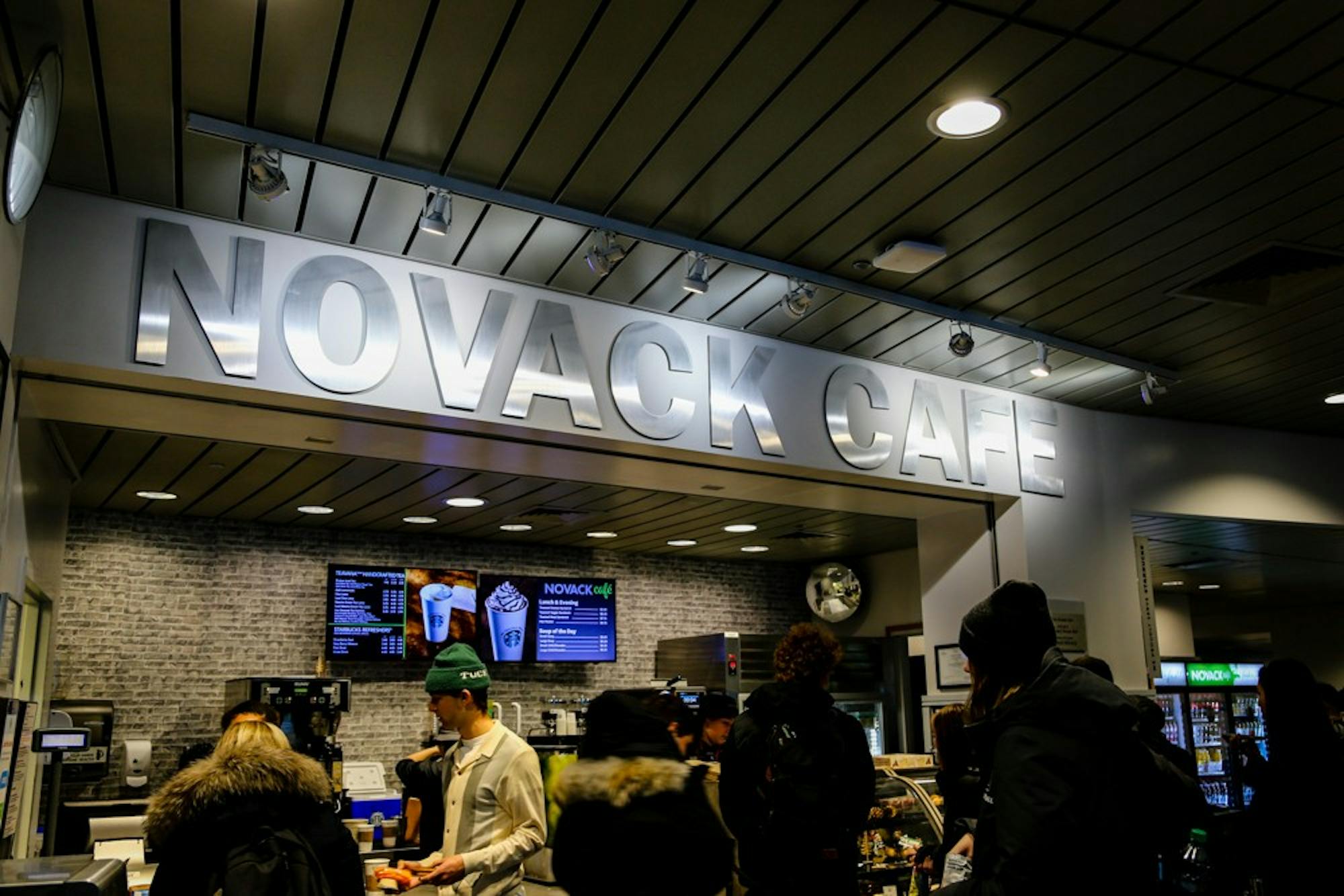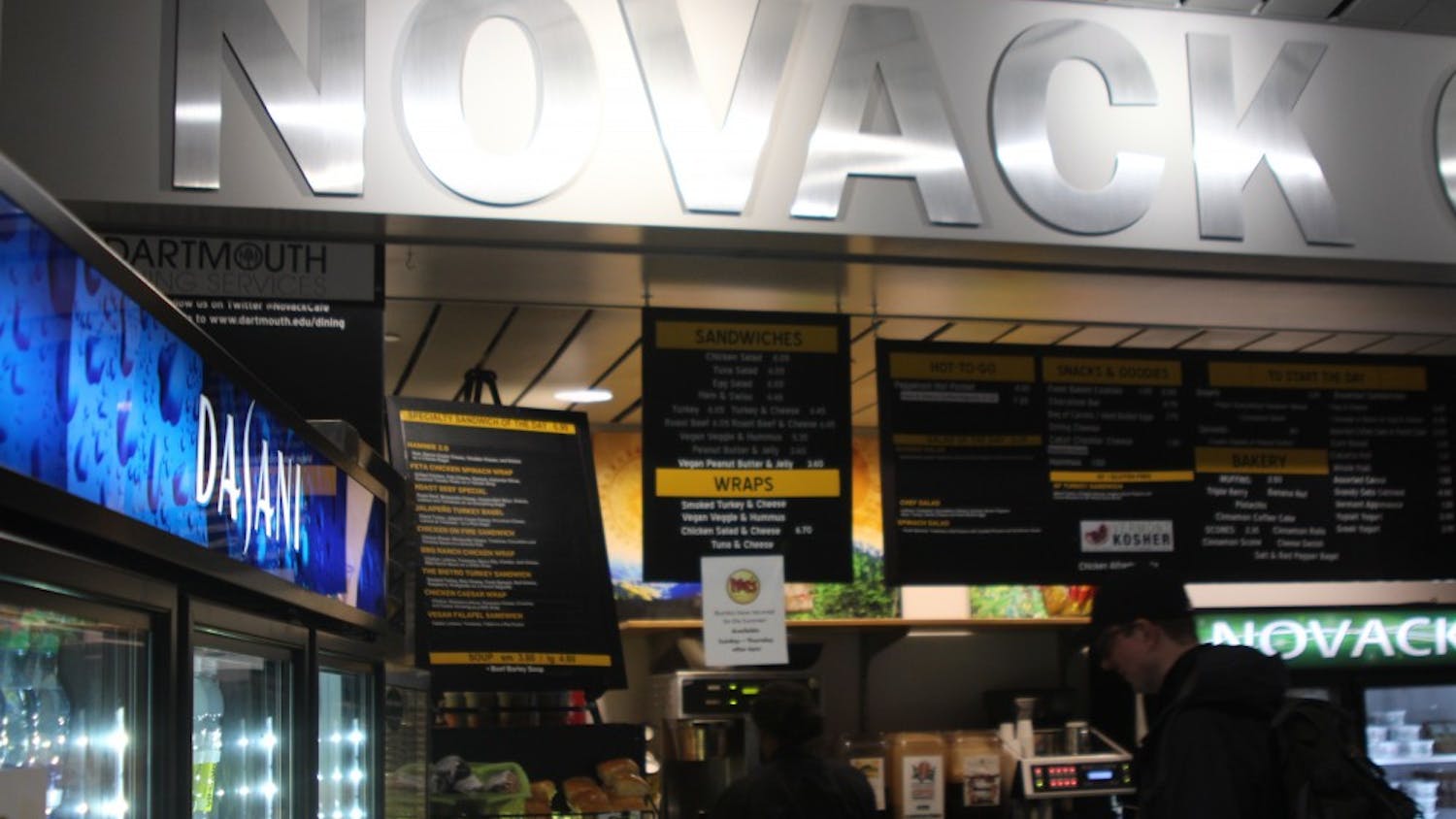This article is featured in the 2020 Winter Carnival special issue.
At Dartmouth, where 10-week terms keep students busy and pressure runs high to participate in extracurricular activities, compete for employment opportunities and have a vibrant social life, it can be difficult to imagine students have time for anything else.
But despite how busy student life can be, Student Employment Office senior program manager Kari Jo Grant wrote in an email statement that a total of 1,858 undergraduate students were hired to work in hourly-paid student positions between Sept. 9 and Nov. 30, 2019. Upon review of hours submitted to Kronos in the fall term, the average number of hours worked in a two-week pay period was between 13 and 15 hours according to Grant.
“Most students are able to work 6-10 hours each week,” Grant wrote. “Depending on their academic course load and schedules, some students may find it reasonable to work more or less than this.”
Even though student employment tends to be manageable, Jose Hernandez ’23 said that his employment as a sales associate at Traditionally Trendy and as an on-floor facilitator at the gym requires precise time management and planning ahead because he does not have as much free time to do homework or relax.
“I work anywhere between 10 to 15 hours a week between Tuesdays and Thursdays and weekends,” Hernandez said. “So, I have to balance my time with when I want to do homework. Sometimes, I have to do all of my homework on Mondays, Wednesdays and Fridays. If I don’t do that, it stacks up on Tuesdays and Thursdays. It can be rough.”
Sayuri Miyamoto Magnabosco ’21, who currently works on research at the Thayer School of Engineering and has previously worked in the library, snack bars, Academic Skills Center, Tutor Clearinghouse and Portuguese department, said she recently decided to cut back on the number of hours she works each week in order to prioritize her academics.
“Sometimes there [were] days I would start doing my school work at 10 p.m., and I would have to pull an all-nighter or something because I had to work beforehand,” she said.
However, according to Iva Devic ’22 who works as a research assistant, sustainability office data analyst and library clerk, the pressure to budget time while working isn’t all bad.
“I’m the type of person who works best when very occupied, so doing this so jobs stimulates me to be more focused with the small amount of free time I have,” Devic said.
Devic added that on a few occasions, she has asked her professors to reschedule office hours due to her work schedule and they tend to do their best to accommodate. She said most are surprised when they hear how much she works.
Brandon Abiuso ’23, who worked in production for the Hopkins Center last term, said that his supervisors often tried hard to make schedules flexible to aid students in managing their time.
“[The Hopkins Center has] a very forgiving system, because you just sign up for different calls when you’re available, and you have to work a minimum number of hours per term but not per week,” Abiuso said.
Hernandez also said that his employers tend to accommodate his academic schedule, and that he never places work before his academics.
“For example, finals week last term I called off the whole week,” Hernandez said. “I let [my boss] know a few days ahead of time, and she happily gave me the whole week off.”
Brandon Crosby, a general manager at the Class of ’53 Commons, echoed Hernandez’s sentiment, and said that getting an education should always be a student employee’s number one priority.
“We’re very flexible here at DDS,” Crosby said. “We have a group email where students can just send an email if they’re going to miss a shift, and usually another student will be able to pick [the shift] up.”
Other student workers also said that they have group emails, GroupMe chats and other mass-communication methods where they can exchange shifts should scheduling conflicts arise.
In addition to putting pressure on students to manage time exceptionally well, campus employment can also make it more difficult for students to participate in extracurricular activities which could potentially contribute to their resumes.
While he recognized this challenge, DDS director Jon Plodzik said he hopes participating in the College community comes before working in his employees’ priorities. He also noted that many campus jobs, especially within DDS, can provide meaningful professional experiences in management, customer service and food preparation.
“Not a lot of our student workers end up in the food service industry, but I think our goal is to teach a lot of skills that are transferable to the real world setting,” Plodzik said. “You know, some of the day-to-day things you do in working a two or three hour shift; you may never run a register or fill a salad bar again, but our goal is to have them progress into more of a leadership role. I think that kind of leadership and management will work well outside of the food-service industry.”
Devic also noted that while some of her choices in employment have contributed to her resume, she’s often had to take more lackluster jobs when she simply needed money.
Hernandez said that working in his first term made it difficult for him to get involved in clubs and organizations, as he had to spend most of his time outside of work doing schoolwork, so he has recently cut down on the number of hours he works each week.
In addition to taking away from academic and extracurricular time, campus employment can also present social challenges. As Miyamoto Magnabosco put it, “I felt like I had very little time to socialize with other people. For example, that is one of the reasons why I decided to join a sorority my sophomore year.”
Still, some students who work are able to make friends on the job, especially in the Sustainability Office, where camaraderie between interns is encouraged, as well as at DDS jobs like Novack and snack bars.
However, some student workers noted that they relate differently to students who don’t work than to other students who do.
“Sometimes when I do group projects, people just don’t look that tired, or they don’t understand why you can’t meet throughout the day, and it might be because they don’t work,” Miyamoto Magnabosco said.
Hernandez said he feels that there is a divide between students who don’t work and those who do, as students who don’t work have much more freedom when it comes to how they spend their time.
“[People who don’t work] always talk about things they do, activities they’re doing, and so I’m always wondering, ‘Well, could I be doing the same things that they’re doing if I didn’t have to work?’” Hernandez said. “And so, I’m always comparing myself in a negative way, and thinking that maybe I’m wasting my time working.”
Although students work in a variety of different positions on campus — from DDS jobs, to library jobs, to UGAs, to tour guides — according to Devic, some jobs are much harder to get.
“I feel like it’s hard to get a good job as a freshman because campus employers tend to employ students who have worked before,” Devic said. “I would not have gotten this library job unless I was here for a short period between summer and fall.”
Miyamoto Magnabosco, who also serves as the Student Outreach Coordinator for International Students Association, identified unique challenges that international students seeking on-campus employment may face.
“We can only work 20 hours per week, and whatever job we’re doing, it has to be on campus, so we cannot get any jobs outside of campus,” Miyamoto Magnabosco said.
She added that the rules for international can be confusing, like one that stipulates that international students cannot be paid through a national grant, which has made it hard for her to pursue research and positions at Dartmouth-Hitchcock Medical Center in the past.
Miyamoto Magnabosco also felt that Dartmouth does very little to support international students in employment. Many campus employers are not aware of the rules and may act ignorantly as a result.
“They just have very little cross-cultural competence or understanding,” she said. “And I wish they knew about these rules.”




